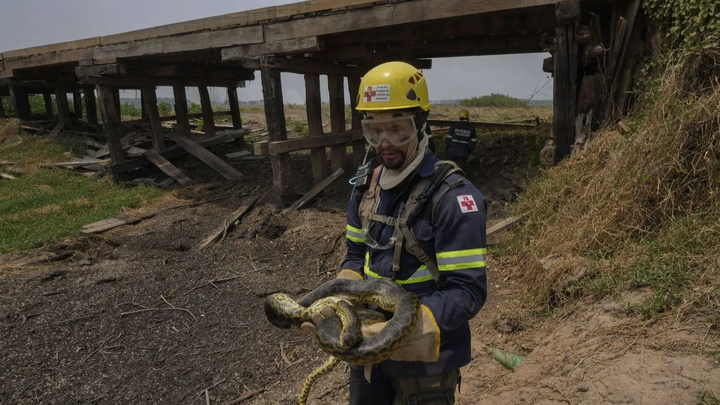
Help Save the Wildlife of the Pantanal in Brazil
We are a non-profit association committed to combating the devastating fires in the Pantanal, the world's largest wetland. Our mission is to protect and restore this vital ecosystem, home to an incredible array of biodiversity, including iconic species such as jaguars, armadillos, and caimans.
I am raising funds to support non-governmental organizations (NGOs) that are tirelessly working to care for the wild animals injured and displaced by these fires. These organizations are on the front lines, providing medical care, rehabilitation, and sanctuary to the affected wildlife.
The Pantanal is not just a natural wonder; it is a biodiversity treasure that holds immense ecological significance. Seeing it suffer and witnessing the plight of its inhabitants has moved me to take action. The animals in this region are not just part of Brazil's heritage but are also crucial to the global biodiversity that we all depend on. As someone with a deep connection to Brazil, I feel a personal responsibility to contribute to preserving this precious ecosystem and its inhabitants.
The funds raised will be directed towards:
Medical Care and Rehabilitation: Many animals have suffered burns and other injuries. The funds will help provide medical treatments, medicines, and veterinary care necessary for their recovery.
Habitat Restoration: The fires have destroyed vast areas of the Pantanal. Contributions will aid in restoring these habitats, ensuring that animals have a safe environment to return to.
Supporting Local NGOs: Local organizations are the backbone of wildlife rescue and rehabilitation efforts. Your donations will support these groups, providing them with the resources they need to continue their crucial work.
Awareness and Education: Part of the funds will be used to raise awareness about the importance of the Pantanal and the impact of these fires. Educational programs will help prevent future disasters and promote sustainable practices.
Your support can make a significant difference in the lives of countless animals affected by these tragic fires. Together, we can help restore the Pantanal and protect its incredible biodiversity for future generations. Thank you for your generosity and for standing with us in this critical effort.
Great Regards,
Mario
STATE OF EMERGENCY - More than 3,500 fires have been recorded since the beginning of the year in the world's largest wetland, a gigantic swamp covering more than 200,000 km², a large part of which is in Brazil.
According to authorities, these fires are primarily linked to human activities, particularly the practice of slash-and-burn for agricultural expansion.
Throughout the Pantanal, the sky has taken on a bright red hue due to the glow of the fires devastating the vegetation.
It is a biodiversity treasure, a wild paradise that is home to several thousand animal species, including iconic ones like the jaguar, armadillo, and caiman. For several weeks now, the Pantanal, the largest wetland on the planet, has been ablaze.
The Pantanal has been ablaze again since the beginning of the year.
According to the Brazilian Institute for Space Research, 3,538 fires have been recorded since the beginning of the year in this massive swamp, which spans over 200,000 square kilometres, three-quarters of which are in Brazil, representing a 2,018% increase compared to the first half of 2023.
Authorities state that these fires are primarily linked to human activities, particularly the practice of slash-and-burn for agricultural expansion.
This also represents a nearly 40% increase compared to 2020 when all records were broken, and 30% of the biome was affected by fires throughout the year. In June alone, 2,639 fires were identified, six times more than the previous record for this month of the year, dating back to 2005.
Massive fires had already ravaged the Pantanal's wildlife in 2020 and 2023.
The situation is all the more worrying because the peak of fires is usually reached in the second half of the year, particularly in September, at the height of the dry season. In the state of Mato Grosso do Sul, located in central-western Brazil, where a large part of the Pantanal is situated, a state of emergency was declared two weeks ago, with reinforcements of firefighters from other states being sent to fight the flames.
The state of Mato Grosso do Sul, located in central-western Brazil and where a large part of the Pantanal is found, has declared a state of emergency.
"I breathe smoke every day," laments Érica Cristina, a bar owner in the city of Corumba, where the sky has taken on a bright red hue due to the glow of the fires devastating the vegetation. According to authorities, these fires are primarily linked to human activities, particularly the practice of slash-and-burn for agricultural expansion.
Firefighters from other Brazilian states have arrived as reinforcements to fight the flames.
But the phenomenon is also exacerbated by climate change, which has caused extreme drought in recent months in this region, recognized as a World Natural Heritage by UNESCO. "This year, the fire and drought arrived earlier. Usually, the gusts of wind, heat, and fires do not start until August," explains Bruno Bellan, a 25-year-old farmer.
More than 3,500 fires have already been recorded since the beginning of the year in the world's largest wetland.
Brazilian Environment Minister Marina Silva has warned that the Pantanal is experiencing "one of the worst situations ever seen" in this ecosystem, which usually regenerates each year thanks to the flooding of the plain during the rainy season.
Due to climate change, the Pantanal has been affected by extreme drought in recent months.
"We did not have the usual floods during the transition between El Niño and La Niña," two climatic phenomena with a significant impact on rainfall, she explained.
For this reason we'll send your
Organizer

SOS PANTANAL UK
Organizer
England